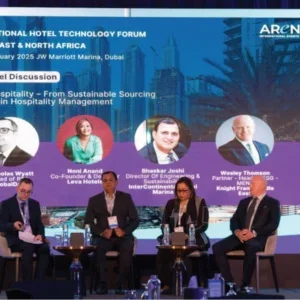
March marks five years since the advent of the pandemic. Gosh, how that’s flown. A chaotic, turbulent bolt from the blue – it was a period that saw the world of hospitality thrust into an unparalleled crisis as lockdowns shuttered venues, halted travel and put millions of jobs at risk.
The sector’s survival through these tumultuous times was nothing short of extraordinary – and was testament to the astonishing levels of ingenuity, resilience and adaptability that truly embodies our wonderful sector. Today, we look back on how the pandemic not only reshaped the industry at that time, but how it has spurred profound, lasting changes that have redefined hospitality’s future.
The ‘new normal’: an operational evolution
The challenges posed by the pandemic led to a dramatic overhaul of operations. Many of the measures initially adopted out of necessity – such as contactless payments, at-table ordering, remote check-ins and more – are now permanent features of a modern hospitality experience. Even QR codes, once dismissed as a gimmick that would never catch on, have become indispensable tools for menus, customer feedback and even payment processing as people – having embraced these things by necessity – have continued to engage with them. Sustainability, too, has become a key operational focus. The shift towards eco-friendly practices, such as minimising energy-intensive aspects of housekeeping and introducing more energy-efficient technologies in support of operations, has not only reduced costs but also appealed to increasingly environmentally conscious guests. Operators have recognised that integrating sustainability into the dayto- day management of a hotel is essential to staying competitive and relevant in an evolving society.
A new way of working
The workforce within hospitality is another aspect that’s undergone a radical transformation. The pandemic demonstrated the importance of flexibility, with hybrid working models and adaptable shifts now common across the industry. For many businesses, Thursday has become the new Friday as remote workers extend their weekends, and this shift has reshaped the patterns of leisure and corporate hospitality alike. Although tricky for many front-facing team members to work from home, it is now a lot more acceptable – and even expected – to complete deskbased projects from the relative quiet of a home office. Employers have also embraced more flexible and parttime working/job sharing than ever before.
Mental health awareness has also risen to the forefront of workplace priorities, driven by younger generations who value wellness and balance over-rigid schedules. Employers are increasingly focusing on fostering positive workplace cultures, and inspirational leadership is more important than ever in recruiting and retaining top talent in a competitive labour market that has a different expectation from previous generations. Yet, staffing shortages remain a significant challenge. As a sector, we were still reeling from the impact of Brexit, which restricted our access to the excellent talent pools on the continent where hospitality is well regarded as a vocation as opposed to a stop gap job, when the pandemic emerged to compound it. With seemingly endless rounds of lockdowns and an uncertain future, many talented individuals chose to leave the industry to pursue other paths, and this is something that still has an impact. Our talent pipelines remain strained, particularly for skilled roles such as chefs. The industry is working hard to address this, from offering enhanced training programmes to positioning hospitality as a desirable, long-term career – but considerable work remains for us to do.
The role of technology
The pandemic turbocharged the adoption of technology in hospitality, with robotic process automation (RPA) and artificial intelligence (AI) playing transformative roles. RPA and AI is now used for everything from labour scheduling and fraud detection to personalised guest interactions. Chatbots, for example, provide instant responses to booking inquiries, while AI-driven analytics offer deeper insights into customer preferences. Without the pandemic, the adaptability and desire to implement new innovations may not have been as great. However, despite its huge benefits to productivity, technology is not a one-size-fits-all solution. Guests have diverse expectations: some prefer the efficiency of digital check-ins, while others cherish the personal touch of a warm greeting. Striking the right balance between automation and human interaction is critical – especially for an industry such as hospitality, which is built on catering for others’ needs. The pandemic, as well as making operators more open has also opened the minds of guests, too. In an ideal world though, the guest should be able to choose their level of interaction with either a human or a machine.

Despite these rapid advancements, access to technology is still easier for the larger establishments and groups. Smaller operators, often constrained by budgetary limitations, face the challenge of implementing advanced technologies that keep up with the bigger hospitality brands, though accessible, costeffective options are emerging that will help level the playing field to some extent.
Economic recovery
The post-pandemic recovery has been a rollercoaster. Initial fears of prolonged downturns were mitigated by ‘revenge spending’, as cash-rich customers eagerly returned to hospitality venues throughout 2022 and 2023 – having been prevented from visiting during repeated lockdowns. This somewhat unexpected surge in demand helped many operators exceed revenue expectations during this period, enabling them to claw back some of the losses from the prolonged closures of 2020 and 2021. However, rising operational costs – spanning labour, energy, supply chains and more – continue to place pressure on profit margins. In the hotel sector, the data suggests that revenue per available room (RevPAR) has recovered to near pre-pandemic levels in key markets, and occupancy rates show steady improvement. Yet, the economic landscape remains fragile – with subdued consumer confidence posing risks.

Data from Venue Performance shows that the events and conference segment has rebounded strongly, driven by the shift towards remote work and the need for in-person collaboration when businesses don’t have a permanent office space to call on. Businesses increasingly use hospitality venues for team building and client meetings, reflecting a renewed demand for face-to-face interactions. Meanwhile, leisure travellers are prioritising shorter, experience-driven trips, with London and regional hubs like Manchester and Edinburgh benefiting from international visitor interest – an aspect that has rebounded post-pandemic.
Sustainability and ESG
Despite the economic challenges thrown up by the pandemic, sustainability remains a focal point for the industry. From reducing energy consumption to implementing eco-friendly practices, hospitality businesses are willing to spend initially to ultimately cut energy costs –and doing so has additional revenue benefits in that it’s also meeting the demands of socially conscious consumers. ESG (environmental, social and governance) strategies are increasingly becoming differentiators for leading brands – with more and more consumers being attracted to operators who are doing things with the greater good in mind.

In addition to environmental efforts, the social aspect of ESG – focused on employee well-being, ethical practices and community engagement – is gaining ever-greater traction. The hospitality industry is uniquely positioned to make a positive impact, and leading operators are using this as an opportunity to build trust and loyalty among both guests and staff. Not only does a positive ESG policy make your venue an attractive place to work, but it also attracts consumers who are looking to take their custom to a business with a positive reputation. The benefits, then, are manifold.
Opportunities and challenges
Looking ahead, the next five years promise further change. The role of AI in personalising guest experiences will continue to grow, with applications ranging from virtual concierge services to predictive analytics for tailoring offerings to individual preferences. Operators must embrace these tools while ensuring that any technological adoption enhances the guest experience without diminishing the industry’s human touch.
Sustainability will remain a priority as the sector strives to reduce its carbon footprint – even if the wider political discourse around the UK’s environmental goals become more muddied by economic necessity. Meanwhile, the rise of experience-led travel presents an opportunity to cater to guests seeking unique, memorable stays – and this tailored, personal touch is something that hospitality operators are so adept at offering. Our ongoing economic headwinds, however, will require operators to innovate continuously to manage costs and maintain profitability – a challenge that shows no sign of abating any time soon.
Resilience and reinvention
The hospitality industry has proved itself remarkably resilient in the face of unprecedented challenges. As we reflect on the past five years, it’s clear that the pandemic has been a catalyst for change, driving innovation and adaptation across every aspect of operations. The lessons learned during this period have laid the groundwork for a sector that is not only stronger but also more forward-thinking. By embracing technology, prioritising sustainability and fostering supportive workplace cultures, hospitality can continue to thrive in an ever-evolving world.






